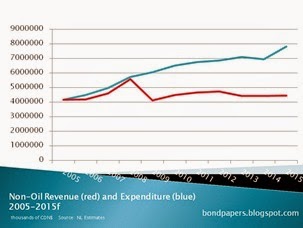In a release, Moody's said that the "negative outlook for the Province of Newfoundland and Labrador reflects the rising risk that the province's fiscal position will deteriorate further than previously expected in an environment of protracted low oil prices and reduced economic activity. Without corrective fiscal action, this will lead to significant deficits, resulting in rapid debt accumulation across the medium-term."
Moody's expects oil to sell at US$33 a barrel in 2016 rising to US$38 a barrel in 2017 and US$43 a barrel in 2018. The company expects that this will lead to significant deficits, with the deficit for the current fiscal year expected to reach 32% of revenue.
"The outlook could be revised back to stable if the province introduces and implements a comprehensive fiscal plan that limits debt accumulation and debt service at levels in line with similarly rated peers, or exceeds these levels for a short period only."

